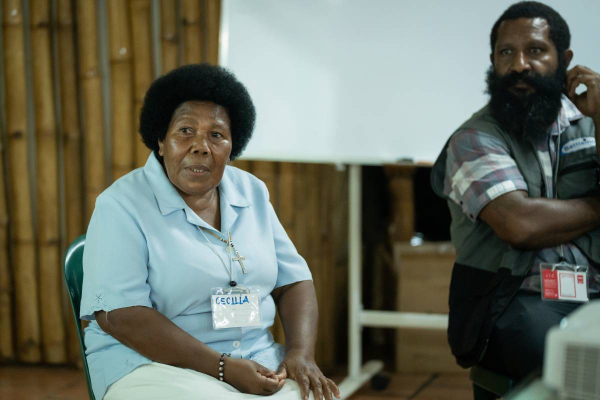Named By Jesus: Invited Into Purpose

One of the hardest things to shake is a label.
I’ve met many full-grown women who still feel defined by words they were called years ago — labels like “fat,” “weak,” “dumb,” “bossy,” “unstable” and “timid.” Names like these stick in our memories.
We can also feel defined by names that were intended to be positive. When I was young, my dad frequently referred to me as “trooper.” He meant it as a compliment — recognition that I would keep going and accomplish things even when they were hard. But I internalized that name over the years and began to deny myself permission to admit when something was too much for me. I’ve struggled with this even as an adult, sometimes remaining in an unhealthy situation for far too long simply because I didn’t want to quit.
The words we internalize carry incredible power. It can be hard to outrun our labels. You probably know someone who has lived under a label, rumor or cloud of gossip and been defined by it — the addict, the cheater, the liar, the victim. Maybe that someone is you.
Jesus understood the power of names.
The Impulsive Fisherman
Simon was washing his nets after an unproductive night of fishing when Jesus climbed into the boat so he could more easily speak to a crowd gathered on the shore (Luke 5:1-3). When Jesus finished teaching, he told Simon to head into deeper water and cast his nets again.

Weary Simon wasn’t prepared for what came next:
“‘Master,’ Simon replied, ‘we worked hard all last night and didn’t catch a thing. But if you say so, I’ll let the nets down again.’ And this time their nets were so full of fish they began to tear! A shout for help brought their partners in the other boat, and soon both boats were filled with fish and on the verge of sinking.
When Simon Peter realized what had happened, he fell to his knees before Jesus and said, ‘Oh, Lord, please leave me — I’m too much of a sinner to be around you.’ For he was awestruck by the number of fish they had caught, as were the others with him. His partners, James and John, the sons of Zebedee, were also amazed.
Jesus replied to Simon, ‘Don’t be afraid! From now on you’ll be fishing for people!’ And as soon as they landed, they left everything and followed Jesus” (Luke 5:5-11, NLT).
As Simon spent time with Jesus, absorbing his teaching and miracles, he grew sure that Jesus wasn’t an ordinary man. When Jesus asked his disciples who they thought he was, Simon eagerly exclaimed:
Jesus responded that God himself had revealed this truth to Simon, and then he spoke words that forever changed how Simon would be known: “Now I say to you that you are Peter (which means ‘rock’), and upon this rock I will build my church, and all the powers of hell will not conquer it” (v. 18). This was a statement about Simon Peter’s proclamation and his purpose. Peter was called to stand firm and teach the unshakeable truth of who Christ is.
You might think this kind of commissioning from Jesus would anchor Peter immediately, steadying and maturing him as he learned to lead. However, the Gospels are filled with accounts of Peter’s impulsive words and reactions, including a shocking attack in which he slashed off the ear of the high priest’s servant (John 18:10).
But Jesus himself predicted Peter’s most stunning failure. Peter said he was willing to go with Jesus and even die for him. Then Jesus answered him: “Die for me? I tell you the truth, Peter — before the rooster crows tomorrow morning, you will deny three times that you even know me” (John 13:36-38, NLT).
As the nightmare of Jesus’ arrest and trial unfolded that night, Peter, consumed by fear for his own life, did exactly what Jesus had said he would: “At that moment the Lord turned and looked at Peter. Suddenly, the Lord’s words flashed through Peter’s mind: ‘Before the rooster crows tomorrow morning, you will deny three times that you even know me.’ And Peter left the courtyard, weeping bitterly” (Luke 22:61-62, NLT).
In the wake of his betrayal, Peter had to face that he was unsteady and unreliable — nothing at all like the name Jesus had given him.
Even after Jesus rose and appeared to Peter and the other disciples, Peter must have still felt lost and unsure because he returned to the one thing he knew best — fishing (John 21:3). He was an unsteady sinner on unsteady water, hauling in empty nets. What would he do now?
Jesus didn’t leave Peter on the water. In the early morning light, Jesus stood on the shore and called out to Peter and the other men. He told them to cast their net again, like he’d done years prior. And, just like before, the net was full of fish.
Unable to contain himself, Peter jumped into the water and swam ashore where Jesus greeted him with food and a needed conversation:
“After breakfast Jesus asked Simon Peter, ‘Simon son of John, do you love me more than these?’ ‘Yes, Lord,’ Peter replied, ‘you know I love you.’ ‘Then feed my lambs,’ Jesus told him. Jesus repeated the question: ‘Simon son of John, do you love me?’ ‘Yes, Lord,’ Peter said, ‘you know I love you.’ ‘Then take care of my sheep,’ Jesus said. A third time he asked him, ‘Simon son of John, do you love me?’ Peter was hurt that Jesus asked the question a third time. He said, ‘Lord, you know everything. You know that I love you.’ Jesus said, ‘Then feed my sheep’” (John 21:15-17, NLT).
Jesus didn’t call him “Peter” this time; instead he said, “Simon son of John.” This wasn’t to punish or insult Peter. Jesus was communicating something profound: His call on Peter’s life wasn’t based on behavior or personality — it was anchored in a relationship with him. The question Jesus asked wasn’t, “Are you solid and steady enough to care for my followers?” but was instead simply, “Do you love me?”
Before Peter could lead, he needed to remember who he was, apart from expectations, roles, successes and failures. He was just Simon son of John — loved and called by Jesus.
The Broken Woman
Peter wasn’t the only follower of Jesus who battled a label of brokenness. When Jesus found Mary Magdalene, she was in profound bondage, under the control of seven evil spirits (Luke 8:2). While we don’t know exactly what Mary looked like in this state, Scripture portrays how possession by demons impacted others Jesus encountered. Luke 8:28-30 describes a man living in a cemetery who couldn’t be restrained by chains and shackles, Mark 17:15 talks about an evil spirit triggering seizures and causing a boy bodily injury and Matthew 12:22 mentions a demon preventing a man’s ability to see and speak.

Imagine the relief Mary must have felt after Jesus rescued her from that kind of horror!
Loyalty grew out of Mary's gratitude, and she stayed with Jesus at the cross when many of his closest disciples abandoned him in fear (John 19:25). Even after he died and was laid in a grave, Mary couldn’t stay away. John 20:1 says: “Early on Sunday morning, while it was still dark, Mary Magdalene came to the tomb and found that the stone had been rolled away from the entrance”&nbps;(NLT).
Jesus’ body was gone. Mary sobbed by the tomb, devastated and confused by all that had happened. What would she do now?
Jesus didn’t leave her there. In the early morning light, he stood quietly and saw her anguish, just like he had years before. Unable to control her weeping, Mary didn’t recognize him as she turned to leave. Then he spoke:
“‘Dear woman, why are you crying?’ Jesus asked her. ‘Who are you looking for?’ She thought he was the gardener. ‘Sir,’ she said, ‘if you have taken him away, tell me where you have put him, and I will go and get him.’ ‘Mary!’ Jesus said. She turned to him and cried out, ‘Rabboni!’ (which is Hebrew for ‘Teacher’). “Don’t cling to me,’ Jesus said, ‘for I haven’t yet ascended to the Father. But go find my brothers and tell them, “I am ascending to my Father and your Father, to my God and your God.”’ Mary Magdalene found the disciples and told them, ‘I have seen the Lord!’ Then she gave them his message” (John 20:15-18, NLT).
When Jesus called Mary by name, everything came into focus. Mary knew him and was known by him. She was the first person to see the resurrected Messiah and the first evangelist given the joyful task of announcing his victory over death. It was not because she had earned the privilege, but simply because Jesus knew her.
She was just Mary — loved and called by Jesus.
Purpose Defined
Peter and Mary struggled to move beyond their pasts into the plans God had for them. But in the midst of their grief and confusion, Jesus showed up and spoke their names. Just their names. Not their titles, labels, strengths or weaknesses. Not lists of what they needed to do to participate in his work.
All Jesus provided was a reminder that he saw and knew them for who they truly were, unhidden and unvarnished.
All Jesus provided was a reminder that he saw and knew them for who they truly were, unhidden and unvarnished. Peter and Mary’s purpose rested in a relationship with Jesus — in intimacy with him, not activity for him.
It was a purpose they could never lose.
Millions of people around the world don't know Jesus wants a meaningful relationship with them because they lack Scripture in a language and format they clearly understand. You can be part of letting them know that they, too, have a purpose!
Invited Into Reflection
Ask yourself these questions as you think about the way that Jesus named and defined Simon Peter and Mary Magdalene:
What names or labels have defined me?
How have I been trying to find my identity and purpose in activity for God instead of intimacy with God?
How would my life change if I found identity and purpose in intimacy with God?
Who in my life needs to know that their purpose rests in a relationship with Jesus? How can I invite them into this knowledge?
God is doing amazing things around the world, and you can be a part of seeing people encounter Him through Scripture in a language and format they clearly understand. Join the work by praying with us!






